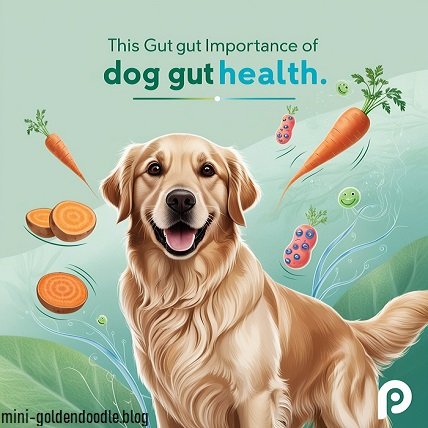Overview
Dogs’ general wellbeing depends on having a healthy stomach, just like that of humans. For the best possible immune system, nutrition absorption, and digestion, a balanced gut flora is essential. For our dogs to live long and happy lives, as pet owners, we must make sure their gut health is robust. Everything you need to know about dog gut health will be covered in this blog post, from comprehending the gut flora to helpful maintenance advice.
Comprehending the Gut Microbiome of Dogs
The complex population of bacteria, viruses, fungus, and other microorganisms living in your dog’s digestive tract is called the gut microbiome. These microbes are critical to the digestion of food, the synthesis of vital vitamins, and the maintenance of a healthy immune system. A balanced gut microbiota improves nutrition absorption, aids in improved food digestion, and guards against dangerous pathogens.
Indices of a Sick Stomach in Dogs
It is essential to identify the symptoms of poor gut health in order to take prompt action. dog gut health with digestive issues may display a variety of symptoms. Constipation or diarrhea are common symptoms that indicate nutritional problems or an imbalance in gut flora. Frequent flatulence and excessive gas may indicate food intolerances or digestive problems. Vomiting frequently indicates stomach distress or illnesses, particularly if it occurs frequently.
What Affects a Dog’s Gut Health?
Your dog’s general health might be affected by a number of things that affect the dog gut health of their stomach. Diet plays a significant role; balanced, high-quality eating promotes a healthy gut microbiota, whereas diets deficient in fiber and excessive in artificial additives might disturb it. Antibiotics are essential for treating infections, but they can also destroy good gut flora, which can cause imbalances.
Diet’s Function in Preserving Gut Health
The foundation for preserving the intestinal health of your dog is a balanced diet. Good sources of protein, such meat, fish, and eggs, offer vital nutrients that help maintain digestive health. Fruits and vegetables high in fiber help to promote the growth of good gut flora and help to regulate bowel motions.
What Separates Probiotics from Prebiotics?
Prebiotics and probiotics work in tandem to promote gut health. A balanced gut microbiota is restored and maintained in your dog when probiotics, which are live bacteria, are given in sufficient doses. Probiotic strains that are commonly useful for dogs include Bifidobacterium and Lactobacillus.
How to Pick Your Dog’s Proper Probiotic Supplement
When choosing the right probiotic supplement for your dog gut health, there are a number of things to take into account. Not all probiotic strains are appropriate for dogs, so be sure the probiotic has strains that are especially good for canine health. Another crucial metric is the CFU (colony-forming units) count, which typically translates to a more powerful supplement. Pick a probiotic product—such as powders, tablets, or chews—that your dog will enjoy.
How-Tos for Increasing Gut Health in Dogs at Home
Your dog’s gut health can be supported by a number of home treatments in addition to dietary modifications and supplements. Nutrient-dense and gentle on the stomach, bone broth helps heal the lining of the stomach and promotes better digestion. Another helpful treatment is plain, cooked pumpkin, which has a high fiber content and aids in bowel movement regulation. Probiotics found in plain, unsweetened yogurt may be beneficial for intestinal health, but before giving it to your dog, be sure they aren’t lactose intolerant.
In summary
The general health and well-being of your dog depend on maintaining dog gut health. You may help your pet live a longer, healthier life by being aware of the variables that affect gut health, spotting imbalances, and putting sensible dietary and lifestyle choices into practice. For specialized guidance and recommendations catered to your dog’s particular requirements, always see your veterinarian.
FAQ
Read more about: menshaircuts.net
How will I know if my dog’s intestinal health is getting better?
Normalizing stool consistency, less gas and bloating, and an overall boost in energy and appetite are all signs of improved gut health. You can verify that your dog’s intestinal health is getting better by observing these good changes.
Can I give my dog probiotics made for humans?
It’s better to utilize products made especially for pets, even if certain human probiotics might be acceptable for dogs. Before giving your dog any new vitamins, be sure they are suitable and safe for him by speaking with his veterinarian.
How long do probiotics take in dogs to start working?
It usually takes a few days to a few weeks for probiotics to start working. To increase gut health and keep it that way, administration must be consistent.

